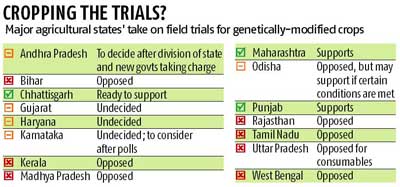GMO task force scheduled to meet in April
Six months ago, as part of his “grand bargain” public retirement and tax package, Gov. John Kitzhaber demanded passage of a last-minute bill prohibiting local jurisdictions from regulating genetically modified crops and seeds.
If lawmakers didn’t pass the bill, Kitzhaber said, he would veto the whole package.
To soften the blow, Kitzhaber wrote a letter to legislative leaders promising to convene a GMO task force that would recommend legislation for the 2015 session and would oversee a Department of Agriculture plan, to be completed by June, for mapping where and when GMO crops are grown and providing buffers and exclusion zones.
So far, the task force has yet to be named.
Kitzhaber’s office has said the task force won’t recommend legislation after all.
“The likelihood of achieving any consensus recommendation on any of these issues is not very good,” Richard Whitman, the governor’s natural resources policy adviser told a legislative committee in February.
And the Department of Agriculture has not started work on the plan.
“We’re waiting for the task force to be announced. That’s the first step before we move forward,” agriculture spokesman Bruce Pokarney said last week.“If the task force meets and that’s something that’s determined we still need to do, then we’ll meet that deadline.”
The governor’s spokeswoman, Rachel Wray, said there is one task force member left to confirm, and spring break is slowing that down. The task force will begin meeting in April, she said.
“These policy conversations were an important part of the agreement that led to the passage of last fall’s compromise legislation to get more money for education,” said Jared Mason-Gere, spokesman for House Speaker Tina Kotek. “The inclusion of those elements from the governor’s letter were critical to pull the whole package together,”
“They were important to the speaker then and she still feels it’s very important that Oregonians see results of that work,” he said.
Senate President Peter Courtney did not respond to requests for comment.
Meanwhile, the local ballot measure that prompted the bill has drawn hundreds of thousands of dollars in campaign contributions from across the country.
Jackson County’s Measure 15-119 was exempted from the bill because it already had qualified for the ballot.
Opponents of the measure so far have raised $308,550.
Most recently Farm Bureaus in Idaho and New Mexico, and sugar beet grower associations in Montana, Wyoming and Nebraska have contributed to the opposition campaign. statemen journal

